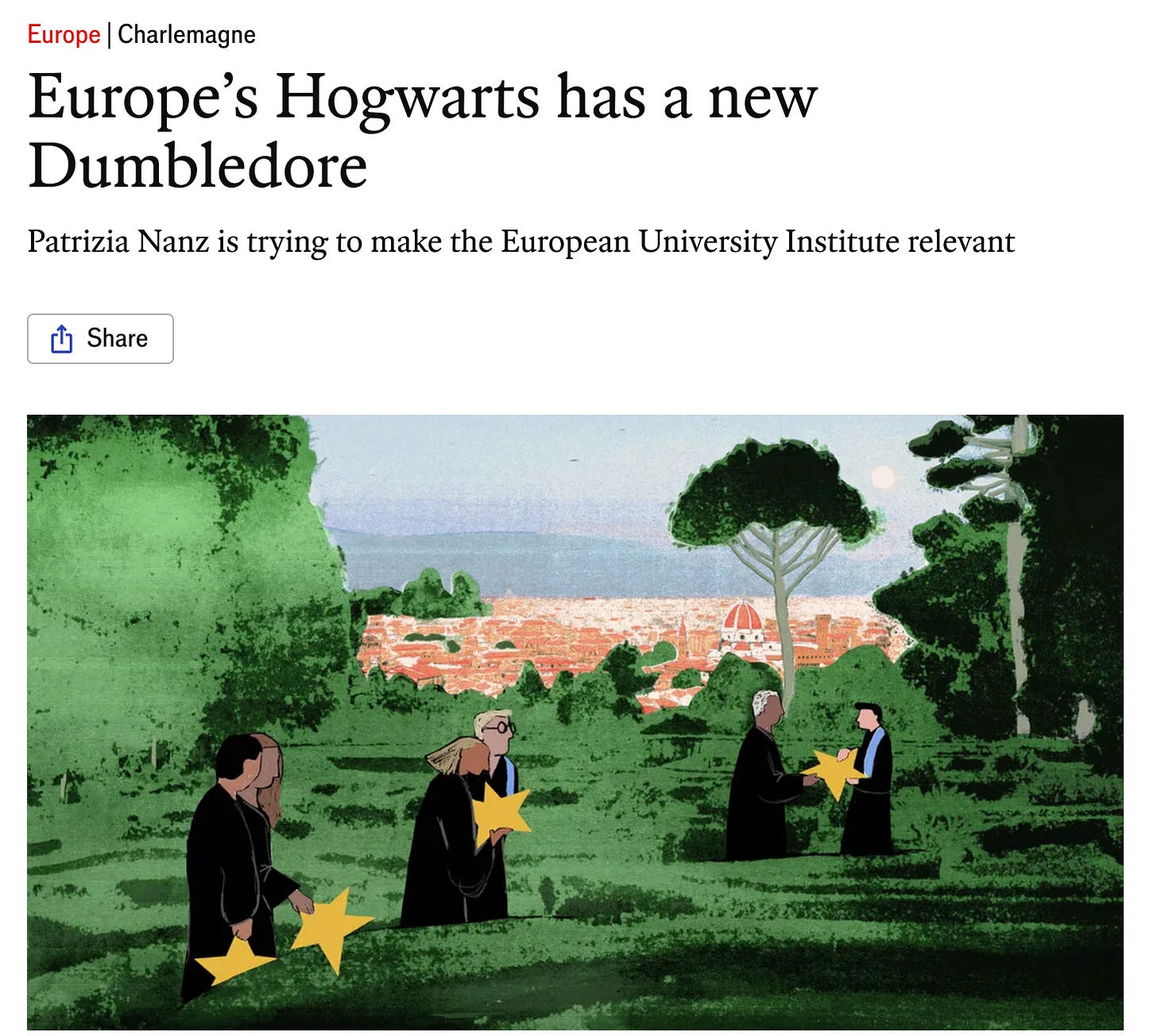The Economist, having surveyed the current state of European higher education, has decided that the most significant problem is that the specialized graduate school where I work is insufficiently “relevant.”

Two objections so far. First, please please please let’s move on from the Harry Potter references. We’re talking about a campus headquartered in an abbey in Florence, the real-life birthplace of the Renaissance.
And second — there’s no need for a pastiche that places the Duomo just behind the main hedge maze, it’s lovely enough as it is.

Maybe this is what The Economist means be “relevance”? Adapting actual historical events and locations into the language of a children’s novel? Engaging in a sort of soft plagiarism of EUI’s visual assets to create a non-existant point of view?
Soon after its founding, however, it became apparent that the EUI’s splendid digs might be distracting its scholars. As one insider explained to Charlemagne: “Left to their own devices, the academics began producing studies of the wool trade in 15th-century Flanders and suchlike.” He was joking—up to a point. A search for recent articles on the EUI’s database produced a list headed by “Silk consumption and dressing practices in late-medieval Catalonia”.
This is rank anti-intellectualism by someone who is apparently just finding out about both the concept of academic freedom and the discipline of History. “Left to their own devices” indeed — who exactly does The Economist think should be directing the energies of academic historians? Linda McMahon? Farage’s Reform UK party is promising a “Patriotic Curriculum” — perhaps that’s a preferable alternative to giving academics discretion over what they study?
Let me grant two of the article’s premises:
- “EUI is among the world’s foremost graduate schools”
- EUI has a remarkably beautiful campus
To the first point — EUI was ranked sixth in the world in the 2024 Shanghai ranking of Political Science departments. Independently, a recently published ranking of the “Research Productivity of Political Science Departments” puts EUI second only to ETH Zurich in Europe (including the UK) on the dimensions of Citations and Top Publications. (These are the “per-faculty” rankings; EUI has a very small political science department and thus doesn’t rank in the top 10 without this per-capita adjustment. An excellent argument for increasing funding and expanding the size of the department, in my view.)
Perhaps more importantly, it is one of the only truly trans-European University in the social sciences and humanities. Oxford and the LSE once played this role but the decade post-Brexit has made them less integrated with Europe; CEU aspires to this but illiberal attacks by the Orbán regime has weakened the institution. Other elite schools remain rooted in national systems, particularly as the Dutch and other northern countries impose national language requirements in a move towards nativism.
The EUI is genuinely, flamboyantly international. It serves a crucial role as a hub of European academic integration. This isn’t just window dressing: professors here forego the perk of tenure in favor of a rotating system which provides a constant churn of perspectives and nationalities. The Max Weber Fellowship is a melting pot of the best and brightest recent PhD graduates from across the continent and indeed the world.
And to the second point — guilty as charged. I hope you can come visit soon.

A primary criticism The Economist raises is that EUI faces a tension between its two primary goals: it’s supposed to be an elite graduate institution and also a feeding ground for European officials:
over the past 15 years or so the channels between the EUI on the one hand and the European Commission and Council on the other became clogged. To be sure, some alumni went on to become commission officials or national politicians. But overall, Europe’s Hogwarts was producing too few practising wizards.
A PhD in the social sciences and the humanities — until recently, the only degree that EUI offered — is simply unrelated to the task of running a government. The EUI was designed to offer a practical degree in conducting specialized research. As Alberto Alemmano points out, this was explicit: this “followed the creation of two older sister institutions: [the] College of Europe and [the] European Institute of Public Administration (EIPA).” Wikipedia tells us that the College of Europe “was the most represented alma mater among senior EU civil servants”; the EIPA is explicitly devoted to the “development of the ability of civil servants to deal with European affairs.” To criticize the EUI for not being a carbon copy of existing European institutions is inane.
The article’s other primary criticism is that the EUI is unsuitable to today’s populist age. This directly contradicts the first criticism — are we to understand that populists would be mollified if only there were more people with EUI PhDs in Brussels? I’m picturing Geert Wilders tearing his hair out in frustration that EU governance is being conducted by people who are insufficiently educated and cosmopolitan.
To be clear, there is a genuine conflict on the table:
It is not clear that the EUI, an institution anchored in the liberal tradition of the EU, can accommodate ideas rooted in Eurosceptic nationalism. Yet the populists are now an inescapable force in the continent’s politics. They have intellectual outfits and erudite pontificators of their own. Their visions of Europe, rooted in religion, ethnicity, conservative sexuality and cultural purity, may be winning out. Why would they come to the EUI to discuss them?
Liberalism involves a bundle of commitments: to individual freedom, minority rights, toleration, rule of law, private property, civil liberties, academic freedom, constitutionalism, human equality and the promotion of opportunity. Liberals tend to view these commitments as mutually reinforcing rather than dimensions on which tradeoffs are possible.
Neoliberals, like The Economist, tend to put the economic freedom bits first and assume that the other dimensions will take care of themselves. Populists are opposed to pretty much everything in that list other than those economic dimensions. As the latter rise in power, the former seem more and more willing to let their social and political commitments fade into the background.
Genuine commitment to liberal principles, like those in EUI’s the founding charter, does not permit this kind of appeasement. It is a mistake to think that if only EUI were to compromise a bit on those commitments*, then the populists’ “erudite pontificators” would come to Fiesole and participate in a genuinely constructive dialogue. They have no use for us; the only solution is to demonstrate our usefulness to our fellow citizens.
It is undeniably the case that liberals need to focus on winning democratic elections and that the best way to do this is to deliver policies that allow our fellow citizens to participate in the good life we envision. “Relevance” is an important goal, but it must be a proactive relevance, a collective construction of a better future, rather than a reluctant reactive relevance to political forces incompatible with our vision.
*And by the way, what concretely do we have in mind here? Should we get rid of the gender studies department? Call our end-of-year event a “Christmas party”? Y’all, I have great news on all both counts.
More generally, having worked in US academia for over a decade before moving to EUI, I can say that the former did in fact have a serious issue with left-illiberalism (since obliterated by the second Trump administration). My experience at EUI has been quite different; there are many conflicts, including on sensitive social issues, but the triumph of liberal values has been inspiring.
{ 11 comments }
wp200 08.11.25 at 1:46 pm
It’s not (just) nativism.
Government assistance for Dutch students has slowly but steadily been whittled away. Thank you, neoliberalism!
There is a general housing shortage, especially cheap rentals in cities. Thanks again, neoliberalism!
Universities in the Netherlands generally aren’t into housing students in dorms. Students are supposed to house themselves. But universities are definitely are into having more
incomestudents. They just love them some extra students, wether foreign or otherwise.And guess what? The number of foreign students in the Netherlands had quadrupled from about 31,000 in 2006 to 122,000 in 2022 (for comparison: that’s twice as high as a % of population compared to foreign students in the USA).
Amsterdam (pop. 930,000) has 2 universities and 28 hogescholen (“universities of applied sciences”). That’s 126,000 students, but only 76,000 can live in the city. There just aren’t enough rooms to let, and the ones available are the most expensive in Europe:
https://www.theguardian.com/commentisfree/2025/jun/30/rents-amsterdam-affordable-newcomers-social-housing
A language requirement is a legal workaround to stem the inflow of foreign students, not just because of nativism (that too), but also to make student life for Dutch students somewhat more attainable and affordable.
It would behove Dutch universities to admit that(a) having twice the no of foreign students as compared to the USA and (b) not having dorms might lead to some… externalities. Instead they just blame students for complaining.
DocAmazing 08.11.25 at 3:24 pm
The Economist would find any institution of higher learning less specialized in profit-making than McDonald’s Hamburger University to be irrelevant.
alfredlordbleep 08.11.25 at 3:49 pm
Ah, Florence.
You think of Machiavelli—
Discourses on Livy.
Not the other work.
Gareth Wilson 08.12.25 at 3:46 am
It’s obviously Brakebills, not Hogwarts.
Matt 08.12.25 at 8:10 pm
A PhD in the social sciences and the humanities — until recently, the only degree that EUI offered — is simply unrelated to the task of running a government. The EUI was designed to offer a practical degree in conducting specialized research. As Alberto Alemmano points out, this was explicit: this “followed the creation of two older sister institutions: [the] College of Europe and [the] European Institute of Public Administration (EIPA).” Wikipedia tells us that the College of Europe “was the most represented alma mater among senior EU civil servants”; the EIPA is explicitly devoted to the “development of the ability of civil servants to deal with European affairs.”
I guess I might be of the opinion that it could be a good thing for the EU if some people with advanced degrees in humanities or social sciences went into EU governance, and maybe a few less people with degrees in public administration. (I’m not against degrees in public administration, but do worry about a sort of over-population with narrow technocrats.)
Chetan Murthy 08.12.25 at 10:07 pm
In 1994 a friend said to me:
“The Economist never met a bloated sclerotic public bureaucracy it liked,
and it never met a bloated sclerotic private bureaucracy it didn’t like”
TM 08.13.25 at 6:50 am
“Left to their own devices, the academics began producing studies of the wool trade in 15th-century Flanders and suchlike.”
Historians studying history is an aberration that cannot be tolerated, and we are totally committed to freedom of speech and viewpoint diversity on campus as long as we (i. e. our oligarchic owners) decide which viewpoints are correct and relevant.
“It is not clear that the EUI, an institution anchored in the liberal tradition of the EU, can accommodate ideas rooted in Eurosceptic nationalism.”
You can only be relevant if you embrace fascism.
These ideas have become totally mainstream among what would formerly have been considered right-leaning liberals but have completely given up on any pretense of liberalism because in the age of Trump, you don’t need to pretend any more.
MisterMr 08.13.25 at 3:23 pm
The wool trader in 15th century Flanders is likely a very important step in the increasing levels of trade in Europe and the birth of the modern era and early capitalism, so I assume it’s an heavily studied subject.
What about disorders among wool workers in 14th century Florence?
Seems more geographically appropriate.
stostosto 08.15.25 at 10:01 am
A search for recent articles on the EUI’s database produced a list headed by “Silk consumption and dressing practices in late-medieval Catalonia”.
I couldn’t seem to reproduce that result. However, a quick glance at the website of Cambridge University does, by contrast and comprison, offer a view into relevant research like this timely study: “Bold as brass. Military musicians returning from the Napoleonic wars invented Britain’s first brass bands earlier than previously thought”.
https://www.cam.ac.uk/stories/napoleonic-wars-veterans-invented-britains-first-brass-bands
tm 08.15.25 at 12:23 pm
The anti-intellectualism of the current crop of fascists may be even more virulent than that of the original Nazis. I don’t think it would have occurred to the Nazis to go after vaccines or after medical research in general, nor do I think they would have expressed this level of disdain for historical and social science (I might be wrong about that but I haven’t read anything of the sort). They of course sought to control the academic and educational institutions (as trump is also trying to do) in order to use them for their own purposes, but they didn’t think it in their own interest to destroy them, as the Trumpists are now doing.
https://www.lawyersgunsmoneyblog.com/2025/08/arts-and-or-sciences
F. Foundling 08.21.25 at 2:17 am
The liberals that the OP describes exist almost only in the realm of theory. In practice we currently see the so-called European ‘liberals’ enthusiastically supporting the dismantling of individual freedom, minority rights, toleration, rule of law, private property, civil liberties, academic freedom, and constitutionalism. Most obviously with respect to Palestine, but also in connection with Russia and Ukraine, etc. The difference between them and those whom the OP calls ‘populists’ concerns mostly the choice of specific targets, not any principle.
Comments on this entry are closed.